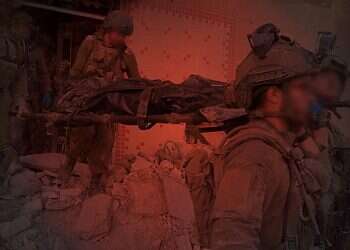Last week, the possibility was touted that Amos Yadlin would be appointed head of the National Security Council. Although Prime Minister Bennett has asked the current National Security Adviser, Meir Ben Shabbat, to remain in office for the time being, he is expected to be replaced soon.
Follow Israel Hayom on Facebook and Twitter
Yadlin says that, contrary to reports, the position was not offered to him. "For 40 years, I served in the IDF, the Air Force, the General Staff, and for ten years I have been a citizen, working in a place that also dealt with national security [as head of the Institute for National Security Studies – YL]. "If they call me to report for duty, I will come, but even if they find someone else, it will be fine, and I will continue to deal with national security from where I am today."
Yadlin refuses to address the wave of slander rampant on social media. He's been given a variety of titles and nicknames, which seem a bit ridiculous given that he is a man with an impressive military and combat record, and the only person in the world who was closely involved in the destruction of two nuclear reactors - the first as a fighter pilot with the destruction of the Iraqi reactor in 1981, and the other as head of the Intelligence Branch, as one of the leaders who made the decision to destroy the reactor in Syria in 2007. There are not many Israelis who have that kind of experience, knowledge, understanding and extensive connections, in Israel and around the world.
Anyone who thinks his professional opinions are based on his political affiliation is welcome to read this interview. Yadlin suggests not only preparing for the possibility of destroying Iran's nuclear program, but also preparing for the destruction of Hezbollah's precision missile project, and seriously considers the possibility of toppling Hamas' rule in Gaza, an idea neither the outgoing nor incoming government dared even discuss.
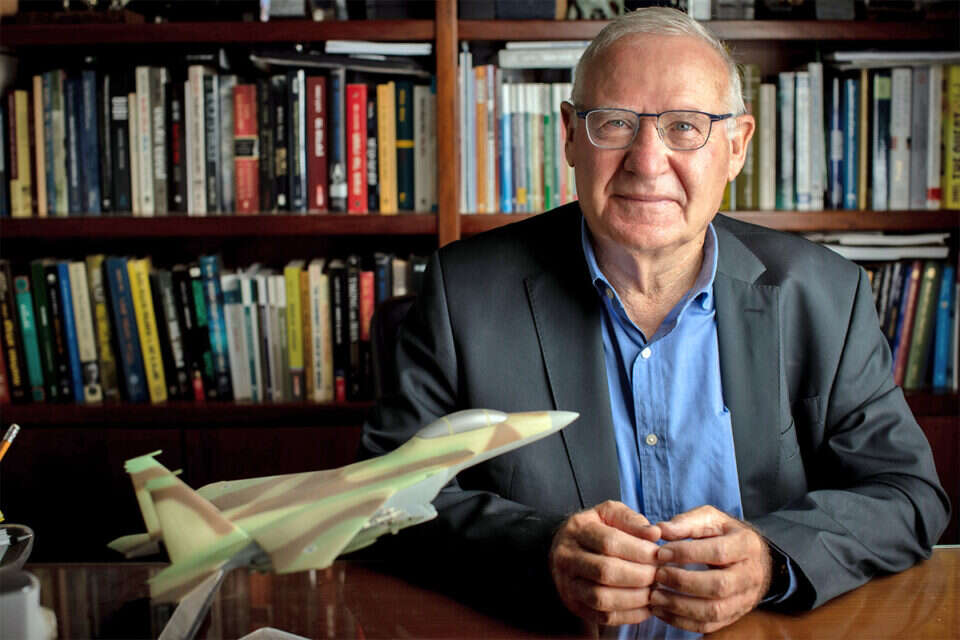
Yadlin believes that there is currently rare public agreement in Israel on most strategic issues. "More than 100 of the 120 Knesset members see eye to eye on the security and political challenges facing Israel. The vast majority, from both the coalition and the opposition, support advancing the following goals: preventing Iran from reaching nuclear capability, preventing Iran's military entrenchment in Syria and Iraq, thwarting Hezbollah's missile precision project, severely damaging and deterring Hamas, cultivating and strengthening the vital alliance with the United States, maintaining good relations with Russia and China, promoting and expanding the Abraham Accords to other countries, and maintaining peace with Egypt and Jordan.
"In all these important issues there is no significant ideological difference between right and left in Israel. Every prime minister in Israel will do his utmost to advance these goals. In fact, the only issue on which there is widespread controversy is the Palestinian issue, which is not on the agenda at all right now."
Before anything else, he believes it is imperative to strengthen relations with the United States, which is Israel's number one strategic asset. "Relations between the two countries are based on a partnership of values, a partnership of interests and trust between leaders, military commanders, and senior professionals. I think all three of these pillars are still very strong, but there are cracks in them. We need to identify these cracks, talk about them openly and professionally, and try to mend them."
Q: Can you explain?
"Let's start with the values. Israel and the United States became close allies mainly because they believe in democracy, a free economy and human rights. The Democrat party has a radical wing, which disputes Israel's belief in these values. We will not convince them, but with the rest of the Democrat party, the mainstream of it, which is close to the center, we need to talk. Explain to them that the values by which Israel acts are still the same common values.
"Then we have to define the common interests. In the past, Israel and the United States were in the American camp, opposite the communist camp of Soviet Russia. Then we were with them together in the face of radical Islam and Iran. We need to make sure that our interests continue to overlap. To some extent, Israel's value as an American interest is rising as the United States now leaves the Middle East.
"There are places where the interests do not completely overlap -- when it comes to the Israeli-Palestinian conflict, or the investments and economic ties with China. They need to be put on the table and talked about. It requires trust.
"In the past, there were periods of great trust between the Israeli and American leadership, and we all understand that in recent years, especially during Democratic administrations vis-a-vis a Netanyahu-led government, that trust was damaged. It needs to be renewed, based on common interests and values."
Q: Do you believe this can be done with the Biden administration? That he will be sympathetic to Israel like the Trump administration was?
"Biden and Trump are different people, but the differences between Republicans and Democrats when it comes to the Middle East are less about essence and more about style. Both parties have led disengagement moves from the Middle East, both see China as the main threat to the US, both do not want a nuclear Iran, and both want to see normalization and peace in the Middle East.
"It is true that Trump was a president who gave Israel unprecedented support, but Biden also has an outstanding record on Israel, and the Democrat party has never abandoned the principle that Israel's security is a top priority. What is needed now is trust among the leaders."
Q: Was it right to promise not to surprise them, as Foreign Minister Lapid has? Netanyahu claims that nothing like this ever happened during his 15 years in power.
"These are diplomatic steps, not military ones. On the diplomatic issue, there is a desire not to surprise. Netanyahu also promised Biden not to surprise him diplomatically. But let's be serious - what diplomatic surprise can Israel make? Veto the Security Council? Call for an international conference? The people who can really surprise are the Americans, surprising us.
"On the military issue, there is no defense alliance that requires updating on military activities. Military freedom of action must be preserved. This is a principle that the United States accepts -- that Israel has the right to defend itself on its own -- because it frees them from having to send soldiers here to defend us, something Israel has never asked for. We are defending ourselves by ourselves."
Q: Former PM Ehud Olmert ordered the attack on the reactor in Syria, going against their position.
"It was not completely against their opinion, but yes, he did not coordinate with them, and certainly did not ask them for permission. He had a yellow light, and a yellow light is fine. We do not want to get a red light from the Americans. The last one to receive a red light from the Americans was Netanyahu in 2012," when Israel was rumored to mull attacking the nuclear project in Iran.
Yadlin believes the outgoing government's policy of not discussing the nuclear deal with the Americans was wrong. "The agreement is a tool to stop Iran. What is clear today to anyone who knows how to count and read IAEA reports is that Iran is closer to a bomb today than in 2018, when Trump withdrew from the agreement. The Biden administration is determined to return to the agreement, but he gave us a hook to hold on to, in the form of acknowledging that this agreement is not good enough."
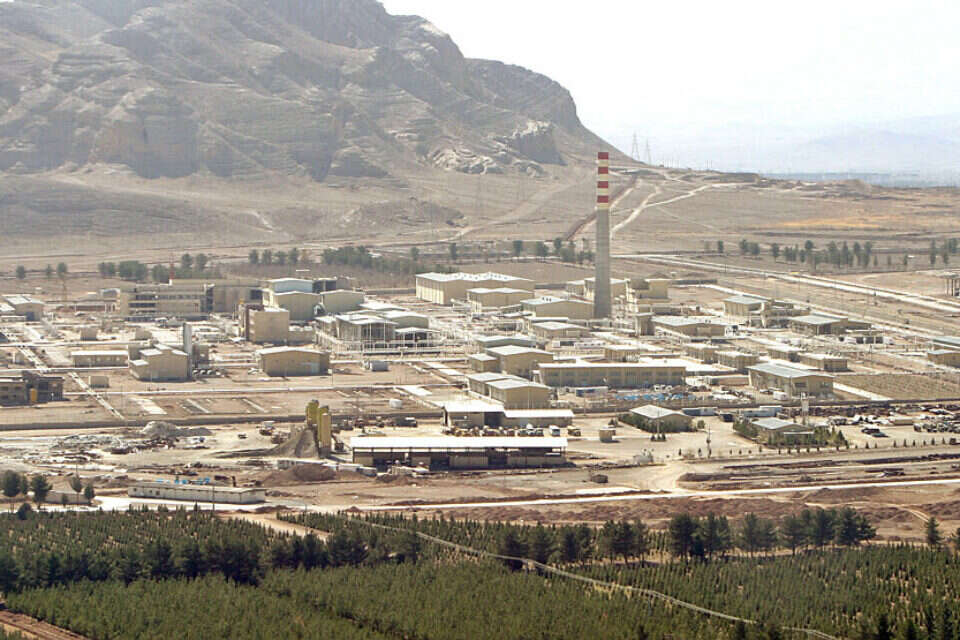
Q: Israel shouted this from the moment the agreement was signed.
"Contrary to claims made in 2015 that the agreement blocks all of Iran's paths to a nuclear weapon, today it is clear that this agreement has many holes, and the Iranians have many ways to get around it. Therefore, the announcement by Secretary of State Blinken that the Americans want an agreement that will be 'longer and stronger', and recently added that it should also be broader -- this gives Israel an opportunity to talk to them about it.
"I should remind you that we are not part of the agreement. We do need to keep saying it is problematic. But we also need to understand that this is their policy, and in order to ensure that they are aware of all the problems in the agreement and will work to amend it, we need to talk to them."
Q: Netanyahu claimed that as soon as you talk about the agreement, it gives them legitimacy to sign it.
"Talking to them does not give legitimacy to the agreement. But let's be blunt for a moment. The Americans will not decide whether or not to sign the agreement because of Israel's position. They do not ask us. Dialogue can affect the content of the agreement. I am looking much further ahead and want to get a commitment from them that if there is no 'longer and stronger' agreement, then we will not reach 2030 [the expiration date of the agreement – YL] when the Iranians have legitimacy for an unlimited nuclear program.
"I suggest that in the dialogue with them we define common criteria, what are the things we are willing to accept, and what are the red lines, that if the Iranians cross them there is no more agreement and we move to another policy. The agreement gives us and the Americans enough time to prepare other options to stop the Iranian nuclear program. If there was such an option, where the Americans or we would stop the program in a way other than diplomacy, I wonder why Trump and Netanyahu did not use it, given the progress of the Iranian nuclear program over the past three years."
Q: Do you think the Americans' withdrawal from the 2018 agreement was a mistake?
"In retrospect, we see that the hopes of those who exerted maximum pressure have not been fulfilled. The Iranian regime has not collapsed, the regime has not come to amend the agreement, and the hopes that their nuclear program will be stopped have not come true."
Back then, Yadlin did not recommend that the United States withdraw from the agreement: he recommended that it use its levers, especially economic sanctions, to amend it. "It was clear to me that Iran would move forward, and I asked the decision-makers in Israel and the United States what they would do when that happened. They told me that the Iranians would collapse from the sanctions. That did not happen, even though in addition to the sanctions, there was also the pandemic and there were demonstrations against the regime. "
Q: Can you explain why that didn't happen?
"Unlike other regimes in the Middle East, the Iranian regime has very strong mechanisms to sustain itself. It controls the mosques, it has strong mechanisms of internal security, it has a private army -- the Iranian army is less powerful than the Revolutionary Guards, which are at the regime's disposal -- and it uses cruelty and oppression towards its population."
Q: What does the election of the new president, Raisi, herald?
"Raisi is a decision of the Supreme Leader, Khamenei, who apparently wants that in the last years of his life, the next president of Iran should be someone in his spirit and image, from the more radical camp. To some extent, Khamenei is also preparing Raisi to be his successor. The choice of Raisi greatly distances the possibility of seeing change in Iran.
"As far as Israel is concerned, there is value in Raisi's choice. It will be easier to explain to the world what this regime is in Iran. But in the end, he was chosen to deal with internal affairs. Foreign affairs will remain in the hands of the Supreme Leader and Revolutionary Guards generals, who are slowly transforming Iran from a republic ruled by the Mullahs into a republic ruled by the generals of the Revolutionary Guards."
A reversal of attitudes
Q: Let's get back to the nuclear issue. The attacks that were attributed to the Mossad, as we saw at the Natanz reactor or the assassination of the Fakhrizadeh nuclear scientists, were they effective?
"It's not binary. They have a positive effect on slowing down the program, reducing some of the potential, hurting Iranian self-confidence. It is difficult to find a replacement for Fakhrizadeh and Suleimani. It is no coincidence that they reached the places they did. Both were very talented people, with a lot of knowledge and charisma. But an Iranian nation of 80 million people, with a great many educated people, will eventually find a replacement. Such and such plans are not stopped by the assassination of one person or another."
Q: So how do you stop the Iranian nuclear program?
"There are five possible strategies. One is an agreement -- a good agreement is better than an agreement with many loopholes. The other -- changing the balance of Iranian considerations by exerting maximum pressure so that the Iranians will tell themselves that if they develop a nuclear program to protect the regime, the sanctions that hurt the economy may hurt the regime more, so it is worth stopping the nuclear program.
"The third strategy is regime change. The fourth is covert operations, below the threshold of war. The problem with this strategy is that it usually lacks the critical mass to stop the program. And the fifth is what has been done in Iraq and Syria – direct, kinetic attack.
"None of these five strategies can stand on their own. Each affects the other. If we go back to 2012, the fact that Israel had a credible military option made the world prefer sanctions on Iran, so that Israel would not carry out that military option. These sanctions led Iran to the agreement.
"Therefore, there is a strong connection between the strategies, and this complex issue should be managed not in simplistic statements of zeros and ones."
Q: In retrospect, perhaps it would have been right to carry out an attack back then, in 2012?
"Performance research experts and nuclear experts state that a country that has the motivation, desire, resources and knowledge, will know how to rehabilitate its nuclear program within three to five years. If we had attacked in 2012, we might have significantly delayed the Iranian program, but it could also be that by 2017 Iran would have had a nuclear program with justification, because its previous program was attacked. These are historical speculations that are very difficult to assess."
Q: As someone who attacked two reactors, is it possible to have a credible attack plan against Iran -- given the scope, spread, depth and sophistication of its nuclear project?
"We need to have an attack plan against Iran, because in the end, if all other strategies fail, there should be a military option. Israel has insisted that whoever calls for its destruction will not be able to destroy it with nuclear weapons. By the way, I always say to my American friends: 'If you want the diplomatic option to be successful, you must have a military option, that the enemy will be convinced that you will exercise it if an agreement you can live with is not reached'."
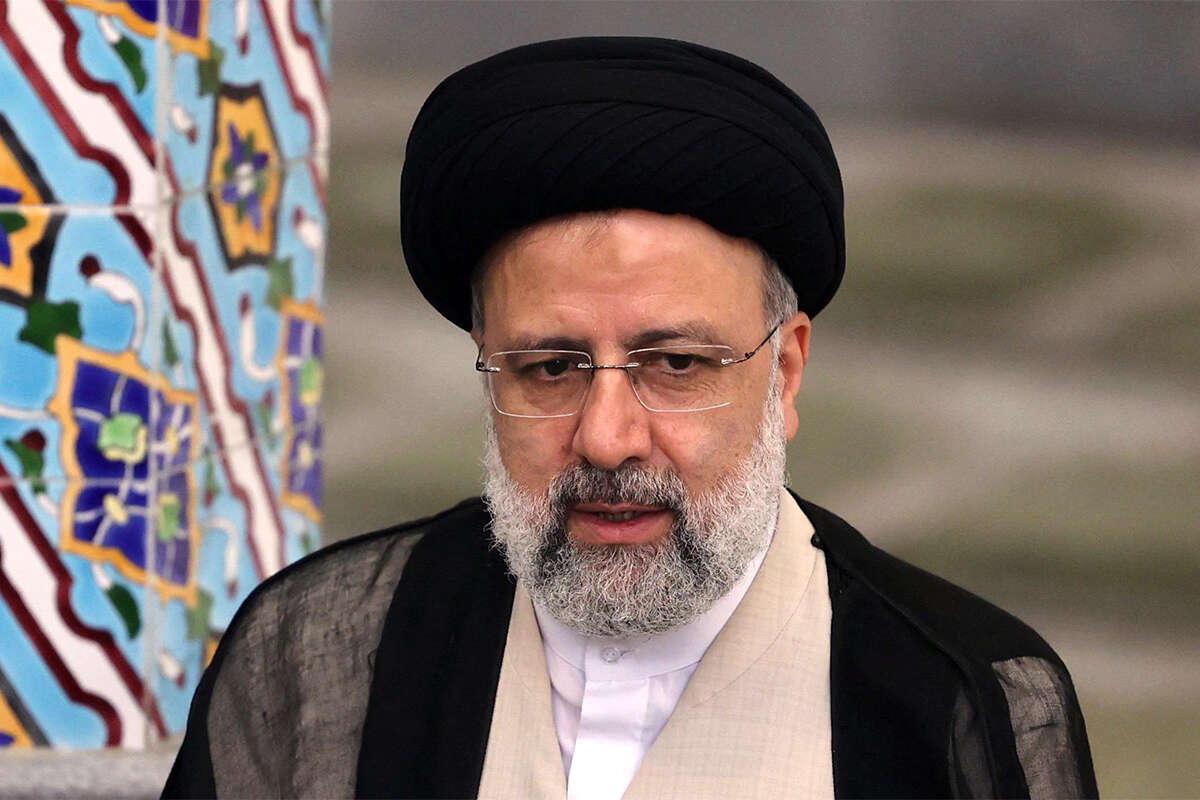
Q: Looking at this current point in time, has Israel failed to halt Iran's nuclear program?
"There is no doubt that in the last three years Israel has not succeeded. But it is also possible to go back. In 1992 there were people who warned that by the end of that decade Iran would have a nuclear bomb. In 2000 there were people who warned that it would happen by 2005. That did not happen. So it depends through what perspective you look at it.
"There is no doubt that today the Iranians are closer to a nuclear bomb than they were in 2018, and also closer than they were at the time of signing the agreement, in 2015. They have more advanced centrifuges, they have more protected sites, so Israel's current score on the nuclear program is low."
Q: If they decide to go for nuclear weapons, how soon do you think they will get there?
"Surprisingly, there has been a reversal of positions between us and the Americans on this issue. Israel has always said that it is a short period of time, only months from the moment of the decision, and the Americans talked about two years. Nowadays, it is Israel talking about two years, and the Americans -- to justify their return to the agreement -- are speaking of a few months.
"What I have learned in the 15 years I have been dealing with the Iranian nuclear program is that it all depends on the assumptions you make. To reach a nuclear bomb you need three components: material, knowledge of the technologies required to attach the material to the bomb, and of course, a carrier platform, missiles, which they already have. Calculating the amount of material needed for the arsenal of the first five bombs is very simple, and according to the efficiency of the centrifuges, you know exactly how long it will take them to enrich the amount of material they need. Unfortunately, this is currently a matter of months.
"As for the second part, the scientists disagree. There are those who think it will be very simple, and will take a few months, and there are those who argue that it will take two years. The Iranians are very close. Everyone uses an assessment that matches their reasoning, so I have only been assessing the issue of matter for years. On this issue, the Iranians are very close."
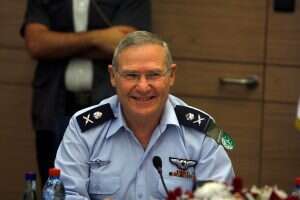
Yadlin, who will celebrate his 70th birthday this year, is married to Karen, and is a father of three and grandfather of five, did most of his service in the Air Force. He commanded squadrons and the bases of Nevatim and Hatzerim, was head of the IAF Intelligence Branch and Planning Department, was commander of IDF Military Colleges and an IDF attaché in Washington, and in January 2006 was appointed IDF's chief of Military Intelligence.
He retired from the IDF in November 2010, and a year later was appointed head of the Institute for National Security Studies, a position he held until recently. He made the institute one of the leading of its kind in the world.
In the INSS' latest annual report, published in January, Yadlin pointed to Hezbollah's missile project as the biggest conventional threat to Israel. He suggested the government discuss it soon and formulate a plan to attack the project, if it approaches critical mass.
"On the northern front there have been 15 years of peace," he says. "We achieved this through the Second Lebanon War, which came under a lot of criticism. No doubt some significant mistakes were also made in it, but in the end, it was also the war that achieved the longest period of peace for the State of Israel without a peace agreement. The previous record belonged to the Sinai Campaign [Kadesh], which achieved 11 years of quiet."
Q: So you're saying we were too critical of the government? Of the army? Of the war?
"You were too critical. You did not understand what we did to Hezbollah in Dahiya when dozens of buildings were toppled, you did not understand the things that did not happen -- the impressive thwarting of the missiles that Hezbollah had from reaching Tel Aviv, and the damage to the medium-range rockets. You concentrated on the short-range rockets, which can only be taken care of if you occupy the area.
"The Israeli public will always have a sense of bitterness in any confrontation that is not one destined for decisive victory. And the short distance rockets will always be fired until the end of the campaign, and it will always be difficult to hit a Nasrallah or a Sinwar, hiding under some hospital, very deep underground, and always in the end they will not release the hostages or the bodies of the hostages. Therefore there will always also be a feeling of bitterness.
"We should get used to the fact that in operations of deterrence, the purpose of which is to achieve many years of peace for Israel, with severe damage to the enemy, we won't see the signing of a surrender agreement as the Germans signed with the Americans in 1945."
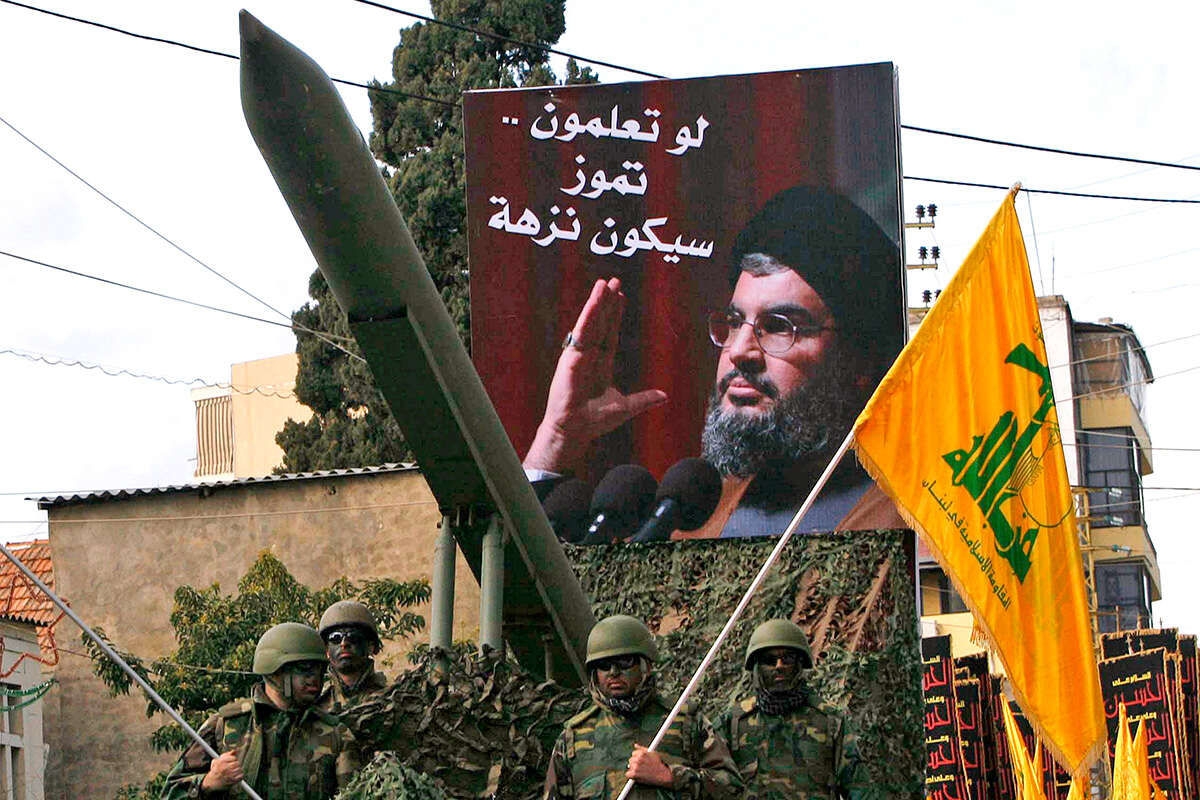
Q: But Hezbollah also deters us.
"It is mutual deterrence. Israel is wary of operating in Lebanon. On the one hand, you see a very significant Campaign Between the Wars in Syria, yet you do not see that in Lebanon, even though we know that Hezbollah has a project to bring missile and rocket accuracy to a GPS level."
The "Campaign Between the War" (CBW) is the doctrine for the ongoing Israeli military and intelligence effort to disrupt the force build-up of the Iranian-Shiite axis throughout the Middle East.
Q: How do you stop their project?
"There are four options. One is to say that we have a strong deterrent, that we have much more accurate bombs than Hezbollah, and that if they dare to fire, Lebanon will not be what it was before and we will return it to the Stone Age.
"The second is to adopt a defense strategy: Israel has the best defense system in the world against missiles and rockets, and it can say that it knows how to defend itself, despite the high economic cost and the fact that the defense is not hermetic, as we have seen.
"The third is to continue what we are doing in the CBW: to delay, to disrupt, to cause this program not to have thousands of missiles, but much lower quantities.
"And the last option -- if we failed to delay and disrupt, and if we think the defense is not good enough, and if we think the deterrence will be harmed by the enemy's ability to hit what deters it -- to attack.
"The State of Israel needs to think about whether to allow this threat to develop into a situation that will endanger it in a way that I define as a top-level strategic threat. In my opinion, this is the number one question for the new cabinet."
Q: Meaning: to draw a red line, and if Hezbollah crosses it then to act?
"I am against red lines, because it oversimplifies things. I spoke about elements: about protection, about disruption and delaying, about deterrence. One has to look at all these elements, and if one comes to the conclusion that all other strategies do not provide an answer, there is no doubt that one should consider the fourth strategy."
Q: Let's talk about the CBW. The hopes that it will make the Iranians give up and leave Syria have been dashed.
"The CBW is very successful, but as you said -- the Iranians have not given up, and they are still in Syria. They realized that the military issue was more vulnerable, so their entrenchment in Syria is now more in infrastructure, to take over from within. They are setting up institutions, from schools to telecommunications companies, and with this, the CBW is less efficient.
"We need to re-discuss this infrastructure establishment as well, and how to continue to stop the three things Qassem Suleimani dreamed of: Hezbollah on the Golan Heights, many missiles and advanced weapons under Iranian control in Syria, and Shiite militias in Syria. We must not allow these three elements to gain traction in Syria. Precisely because of the success so far, we must constantly examine the risks."
Campaign Between the Wars
"That we lose planes and pilots, that we accidentally hit the Russians, with whom we have an excellent coordination mechanism in Syria, and that we bring about an escalation. There is unfinished business between Iran and Israel, so we must be constantly aware of the Iranian response and their attempts to escalate."
Q: Do you agree with the belief that the next war in Lebanon will be the first northern war, or the first missile war, with launches from Iraq as well, and perhaps even from Iran itself?
"The likelihood of an all-out war is not high, but it must be taken into account. Nasrallah, Assad and the Iranians are also very careful, and they have good reason. Israel is very strong, and everyone appreciates what it can do to them.
"On the other hand, since the Yom Kippur War, we have enjoyed the fact that all wars have always been on one front -- in Lebanon, in Gaza, or in the CBW in Syria. Today there is a radical axis led by Iran, which can at some point try to unite all the components together. We need to prepare for the most serious scenario and know that we have a solution. "
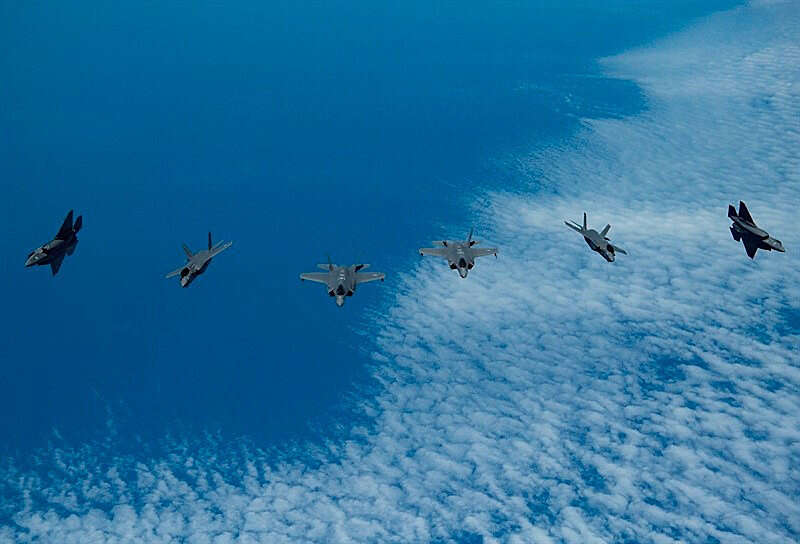
Yadlin is a strong supporter of the Abraham Accords with the Gulf states, and believes there is a possibility of extending them to other countries. "Saudi Arabia is being challenged by Shiite radicals led by Iran and by the Sunni jihadists and Muslim Brotherhood, and has a strong interest in promoting normalization with Israel, certainly in light of the declining US involvement in the region.
"But Saudi Arabia also has its limits. The normalization agreements were triangular, and the Americans were an integral part of them. They also gave F-35s to the Emirates, they removed Sudan from the terrorist list and gave it financial aid, and they gave Morocco recognition of the Western Sahara. With Saudi Arabia the American component is missing, because the Biden administration and the Saudis have not yet reconciled their differences.
"It's also worth mentioning that the Saudis led the Arab Peace Initiative, and normalization with Israel actually circumvents this initiative. And since the nixing of the annexation plan was given to the Emirates as part of the agreement with them, the Saudis will also ask for something from Israel in the Palestinian context. It will be more difficult, because the new Israeli government has decided that on the Palestinian issue it will not deviate from the status quo. "
Q: Is the sale of F-35s to Saudi Arabia something that can be considered?
"I think it is very problematic, because unlike the Emirates, which is a distant and small country, here we may break the principle that we always maintain a qualitative edge versus our neighboring countries. Even Egypt, with which we have had peace for 40 years, did not receive F-35s."
Yadlin is troubled by the shaky relations that the Netanyahu government had with Jordan, which in recent years has degenerated, he says, into a "dangerous slump". "Jordan is an important country, with our longest border. Its existence is a guarantee that we will not meet Iranian forces and Shiite militias from Iraq on the eastern border. There is a lot of room for cooperation in the economic development of the two countries -- on issues of water, green energy, industrial areas, tourism and agriculture, and therefore it is very important to renew the trust between the king and the Israeli leadership. "
Q: Was Operation Guardian of the Walls a success?
"It was a successful military operation, mainly in defense, but less in its ability to hit senior Hamas figures. But it was also a problematic operation both perception-wise and psychologically, and in terms of positioning Hamas as a leading factor in the Palestinian arena. As I said after Operation Protective Edge in 2014, there was a strategic, but asymmetrical, tie here, as well. We achieved things on one level, and they achieved things on a completely different level."
Subscribe to Israel Hayom's daily newsletter and never miss our top stories!
"We still need to see if this operation has changed anything in Hamas' demands, and how it will behave in terms of firing on Israel. We determined that firing on Sderot is the same as firing on Tel Aviv, and that launching an explosive balloon is the same as a rocket, and that the entire humanitarian issue -- the opening of crossings, fishing, rebuilding -- will be conditioned on the issue of our prisoners and missing persons. Hamas is very far from accepting these conditions."
Q: Is it possible to move forward with Hamas as long as Sinwar is in charge?
"Sinwar has changed himself from one who cares deeply about the well-being of the people of Gaza, and who was ready for a settlement so that Gaza can be rebuilt and progress on infrastructure and humanitarian and economic issues, to someone who is leading towards another conflict. Therefore, he is someone who would be better not leading it. "
Q: And what about Hamas in general?
"The Israeli approach was to keep Hamas as an address, and therefore not to hit it too hard. Let it be deterred and weakened. What actually happened was that we were unable to deter it, nor weaken it. Hamas got stronger round after round. Therefore, I suggest to let go of this assumption, and to strike Hamas with all our might, and if it collapses, it collapses.
"Today there can be nothing worse in the Gaza Strip than Hamas, which fired thousands of rockets at all ranges only last month. Therefore, in my opinion, Israel should not hand Hamas diplomatic advantages, and certainly not military immunity."
Q: Will there be another round?
"I presume it can happen, maybe even in the next few weeks or months."


